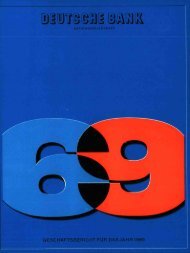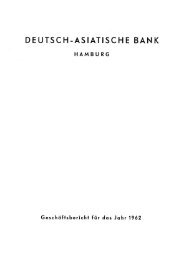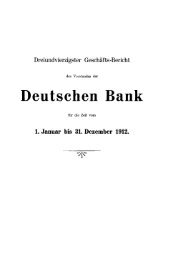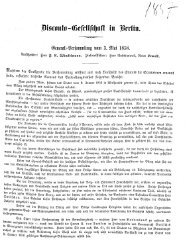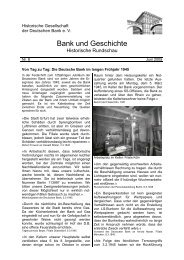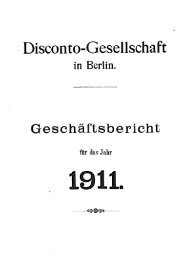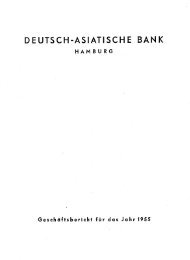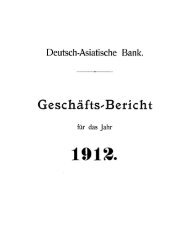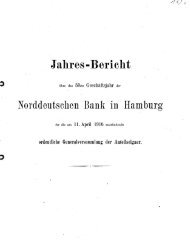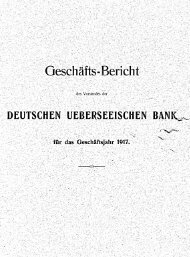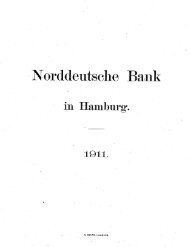Deutsche Bank AG - Historische Gesellschaft der Deutschen Bank e.V.
Deutsche Bank AG - Historische Gesellschaft der Deutschen Bank e.V.
Deutsche Bank AG - Historische Gesellschaft der Deutschen Bank e.V.
You also want an ePaper? Increase the reach of your titles
YUMPU automatically turns print PDFs into web optimized ePapers that Google loves.
New issuing record on the German share market<br />
The German share market achieved a record result<br />
in 1989. The volume of new issues clearly exceeded<br />
the peak level of 1986. The number of new listings<br />
also increased again: 24 companies with an issue<br />
volume of DM 2.4 bn. were introduced to the stock<br />
exchange.<br />
In 1989 prices rose more strongly on the German<br />
share market (DAX Index +35%) than on the other<br />
major international stock exchanges. However, the<br />
shock wave on the German stock market on October<br />
16, caused by the crash on Wall Street, produced the<br />
highest losson one day in the post-war period (about<br />
13%) - that was more than on any other bourse. On<br />
balance, construction and construction-related<br />
stocks, consumer goods, steel, energy, engineering<br />
and big bank shares made the greatest gains in 1989.<br />
Owing to the strong growth of the German economy,<br />
the profit dynamic and the attractive opportunities<br />
arising from the opening-up of Eastern Europe,<br />
international institutions increasingly concentrated<br />
their investment strategy on the German share<br />
market towards the close of the year.<br />
Germany as a financial centre needs further<br />
liberalization<br />
Further steps were taken in 1989 to strengthen<br />
Germany's role as a financial centre, including various<br />
<strong>der</strong>egulatory measures:<br />
- The minimum lifetimefor new issuesof DM foreign<br />
bonds was reduced to 2 years.<br />
- Stock exchange trading of securities denominated<br />
in foreign currency or in units of account (e.g. ECU)<br />
was made possible.<br />
- Since January 1990 residents in the Fe<strong>der</strong>al Repub-<br />
lic have been permitted to issue bonds in foreign<br />
currency and the official units of account ECU and<br />
SDR.<br />
- The legal prerequisites for <strong>Deutsche</strong> Terminbörse<br />
(DTB) were created by an amendment to the Stock<br />
Exchange Act.<br />
At the end of January 1990 DTB successfully<br />
started business - initially in share options; futures<br />
contracts in the share index (DAX) and a "notional"<br />
German government bond will follow in the Course of<br />
1990. In the medium term additional interest rate fu-<br />
tures contracts are to be introduced to trading.<br />
Germany's stock exchanges will also be streng-<br />
thened by technological improvements, in particular<br />
the new lnterbank Information System (IBIS). This<br />
System brings greater transparency to over-the-<br />
counter share trading and thereby complements<br />
traditional floor trading.<br />
Additional measures are necessary if Germany is<br />
to remain a competitive international financial centre.<br />
Thus, in 1990 the approval procedure for new issues<br />
pursuant to §§ 7951808a German Civil Code, which<br />
up to now has hampered in particular the wi<strong>der</strong> is-<br />
suance of industrial bonds, is to be discontinued. In<br />
addition, stock exchange turnover tax is to be abol-<br />
ished on January 1,1991; company tax and bill tax are<br />
to go a year later.



